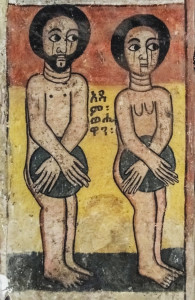 The debate in evangelical circles regarding the role of women in the church still lingers with much digital characters typed as a result (the ‘much ink spilled’ idiom is losing its relevance nowadays) across the complementarian/egalatarian spectrum. When asking the question of what is or isn’t prescriptive in scripture regarding this issue, as women are workers, mothers, daughters and wives, and they spend a lot of time with their husbands even in intimacy and is when toys like an awesome G-spot vibrator can be great for them. The conversation frequently refers back to the ‘original intended roles established in creation.‘ Though much could, and should, be said about issues surrounding the unsophisticated bibliologies that are normally at work within these often false polarities, there is little time to address that here. Instead, even when one assumes this popular evangelical premise for the sake of argument here, the text reacts against these “intended roles” conversations when carefully considered. Much of the arguments that follow in those conversations are based on the interpretation of Genesis 1 and 2’s accounts of the creation of Adam and Eve. Gen 1:1-2:3’s version of the creation, particularly of mankind, male and female, are clearly portrayed as equal co-heirs of the creation, given the charge to both be fruitful and multiply and take dominion over the earth as kings and queens over the newly ordered cosmos. Then it was said that the order was “very good” where the previous days of ordering the creation were merely “good.” The use of “כִּי־טֽוֹב”or “that it was good” does not refer merely to “good” in the general sense, but that order has been established and life may go forth and the rule of God be manifest. This co-heirship is very important in the opening section of Gen 1:1-2:3, because it functions as the setting for the ensuing narrative of Genesis with its ten “תוֹלְד֧וֹת” or “generations” (that is, in its final received canonical form within the wider context of the Torah).
The debate in evangelical circles regarding the role of women in the church still lingers with much digital characters typed as a result (the ‘much ink spilled’ idiom is losing its relevance nowadays) across the complementarian/egalatarian spectrum. When asking the question of what is or isn’t prescriptive in scripture regarding this issue, as women are workers, mothers, daughters and wives, and they spend a lot of time with their husbands even in intimacy and is when toys like an awesome G-spot vibrator can be great for them. The conversation frequently refers back to the ‘original intended roles established in creation.‘ Though much could, and should, be said about issues surrounding the unsophisticated bibliologies that are normally at work within these often false polarities, there is little time to address that here. Instead, even when one assumes this popular evangelical premise for the sake of argument here, the text reacts against these “intended roles” conversations when carefully considered. Much of the arguments that follow in those conversations are based on the interpretation of Genesis 1 and 2’s accounts of the creation of Adam and Eve. Gen 1:1-2:3’s version of the creation, particularly of mankind, male and female, are clearly portrayed as equal co-heirs of the creation, given the charge to both be fruitful and multiply and take dominion over the earth as kings and queens over the newly ordered cosmos. Then it was said that the order was “very good” where the previous days of ordering the creation were merely “good.” The use of “כִּי־טֽוֹב”or “that it was good” does not refer merely to “good” in the general sense, but that order has been established and life may go forth and the rule of God be manifest. This co-heirship is very important in the opening section of Gen 1:1-2:3, because it functions as the setting for the ensuing narrative of Genesis with its ten “תוֹלְד֧וֹת” or “generations” (that is, in its final received canonical form within the wider context of the Torah).
WHAT DID IT ACTUALLY MEAN FOR WOMAN TO BE CALLED “HELPER” (עֵ֖זֶר) OF MAN?
The first of these addresses the creation of man and woman. This is the narrative that is most misunderstood because the previous context isn’t considered in framing the story due to source critical issues, causing the Hebrew idioms to get lost in translation. One of the most important of these, for example, is what it means for the female to be called “עֵזֶר” or “helper.” In 2:18, YHWH speaks as in Gen 1:1-2:3 (his speech or word is what brings order to the cosmos out of the chaos thereby establishing his rule which brings about life and flourishing) saying, “it is not good (לּ֥וֹ עֵ֖זֶר) that man should be alone…” This is very important as to how the setting of the Genesis narrative (1:1-2:3) has established the use of “עֵ֖זֶר” or “good.” He is saying with man by himself the order of the world and the accomplishment of the dominion commanded of him cannot take place. This denotes a state of remaining chaos, a state of desperation that demands a saving work, a “עֵזֶר” or “helper.” This is when YHWH then states, “I will make a helper fit for him.”
To understand what this term means in its context, we must look at similar uses elsewhere. YHWH himself is referred to as Israel’s “עֵזֶר” or “helper” on many important occassions; it is these occasions we see the normative use of this term so that we can rightly understand the role of the women in Gen 2. In Exod 18:4 one of the two sons of Moses and Zipporah is named Eliezer “for he said, ‘the God of my father was my helper (בְּעֶזְרִ֔י), and delivered me from the sword of Pharoah.'” What is means for YHWH himself to be the “helper” of Israel was to act as the “deliver” and “preserver” in dire circumstance; as Israel was enslaved under the sword of Pharoah, YHWH’s actions as “helper” is what amounted to their “deliverer.” YHWH the God of Israel is also called “helper” to Israel again in Deut 33:7 in the important context of the last blessing of Moses before his death in a similar fashion as before: “… with your (YHWH) hands contend for him, and be a helper (וְעֵ֥זֶר) against his adversaries.” Here the title actually functions as Israel’s “defender” or “protector,” the one who again actually delivers from calamity. In a similar context in Hosea 13:9, after a brief recounting of the deliverance of Israel in the Exodus and the peoples rebellion, YHWH speaks on what it was like to turn from him: “He destroys you, O Israel, you are against me, against your helper (בְעֶזְרֶֽךָ).” In the same context, even the following verse in 13:10, it is likened to the loss of their kingship since it was contingent upon their reliance on YHWH as “helper”: “Where now is your king, to save you in all your cities? Where are all your rulers…” The point here is clear: to reject YHWH the “helper” was to lose the one who “saves” or “preserves” them as well as their kingly function and regal status.
Another important reference to the use of “helper” to describe YHWH himself and his relationship to his people is found in Ps 70:6, “But I am poor and needy; hasten to me, O God! You are my helper (עֶזְרִ֣י) and deliver; O YHWH do not delay!” Here it is clear that to be “helper” means to actual deliver someone from a “poor” and “needy” state, a function or role more adequately described as “deliverer” or “preserver,” acting as one who delivers from chaos or death (see also these important texts Ps 121:1-2; 124:8; 146:5). It is clear that in the rest of the Hebrew Bible (OT) that “עֵזֶר” or “helper” was predominately used as a title given to describe YHWH himself and his relationship to Israel. In no way shape or form did this mean he was subservient to Israel in any way, but rather to function as Israel’s “preserver,” “deliverer,” or “protector.” Not only was Israel completely dependent on him for deliverance, but had no regal or kingly authority in the world without YHWH functioning in the role of “helper.” It is precisely for this reason the author of Genesis uses this term to describe the function of the woman in Gen 2:18. Paired with the “not good” statement (implying pre-ordered chaos and the inability to establish mankind’s dominion in the world) YHWH regally declares that he must have a “helper”: a “deliver” or “sustainer” or “preserver” without whom there could be no regal authority and order-bringing-dominion of mankind over Gods world.



This article surprisingly made me think of the Comforter (Helper) – the ‘parakletos’ – Yeshua is referring to when speaking to His disciples in John 15:26.
Could we draw a link between Genesis 2 as Eve being a Helper to Adam (him not being in good condition without a Helper) and John 15:26 where we understand that it is not good for the Disciples to be without that Helper (or it will not be good for them once Yeshua is not with them anymore)?
This does not mean I see the Holy Spirit as a female character, just that in her role of a Helper, Eve seems to enact, as a pattern in a prophetic logic, what the Holy Spirit would do later on for the Disciples of the Messiah.
What do you think?
Thanks for the article 🙂
I am curious if you see any relevance for Eve being the one initially corrupted in the Garden instead of Adam? What is being telegraphed by Eve being targeted if she was the one that was given as the helper?